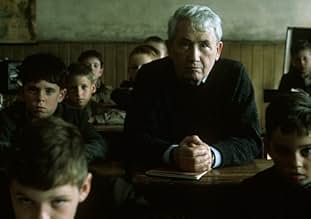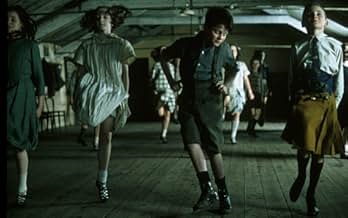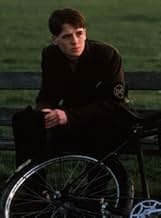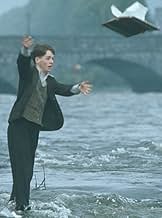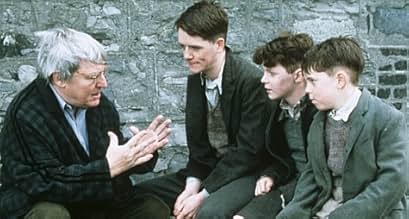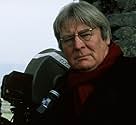An Irish Catholic family returns to 1930s Limerick after a child's death in America. The unemployed I.R.A. veteran father struggles with poverty, prejudice and alcoholism as the family endur... Read allAn Irish Catholic family returns to 1930s Limerick after a child's death in America. The unemployed I.R.A. veteran father struggles with poverty, prejudice and alcoholism as the family endures harsh slum conditions.An Irish Catholic family returns to 1930s Limerick after a child's death in America. The unemployed I.R.A. veteran father struggles with poverty, prejudice and alcoholism as the family endures harsh slum conditions.
- Director
- Writers
- Stars
- Nominated for 1 Oscar
- 5 wins & 12 nominations total
- Narrator
- (voice)
- Young Malachy
- (as Shane Murray Corcoran)
- Director
- Writers
- All cast & crew
- Production, box office & more at IMDbPro
Featured reviews
But the 1930's in poor suburbs of New York in the Great Depression was hardly a friendly environment lurking behind the awesome sight of the lady with the torch in the harbour (a present of the French Government).
`Angela's Ashes' records those grim years for a poor family, based on hard autobiographical facts; but Frank McCourt's book better conveys that curiously Irish sense of fatalistic humour combined with that strangely abject Catholicism so pervasive in life of those times. The elements contrast and contradict themselves: the useless alcoholic father who must be respected because he is their father, though later he disappears, and the boy's (Frankie) obedient and supposedly devout sessions at the confessionary box, would seem to veer into mirth if it were not for the sinister underlying sociological aspects. And it is the classroom where much of this spoon-fed doctrinal interpretation obviates the ruthless imposition of supposedly `clean' ideology - whether Catholic or not.
Beautifully filmed in almost black and white, with more colour creeping in as the film progresses, undoubtedly Alan Parker has done a good job and has tried to remain faithful to the philosophical concepts of the book. Excellent Emily Watson and Robert Carlyle, but no less so the different youngsters used in the film as the children grew up, especially Michael Legge. Other secondary actors are all exemplary, well cast. The result is a film that has an authentic feel to it, such that having already read the book and seeing this film twice in no way diminishes the interest it suscitates. The music is a very different kind of John Williams to what we are accustomed, giving correct ambience to the story's unfolding.
This is a very pure, almost sterile, adaptation of the original memoir "Angela's Ashes" by Frank McCourt. It chronicles vignettes in the family history of the McCourt's, a poor Irish Catholic family struggling to survive in early 20th century Ireland. The film, like the book, is stark, painful, hopeful, powerful, and deftly accurate. More than a period piece, this film works as a dramatic rendering of social history.
Unlike the book, this film depicts Frank's childhood from a disembodied third person perspective, though it is liberally complemented by an effective voice-over narrative drawn almost directly from McCourt's own prose. Frank is the oldest of several siblings (many of whom never reach adulthood), in a family suffering from poverty, alcoholism, and persecution. Although the film has many positive messages, like the lives of the McCourt's, it's not an easy road. Those who wish to be simply entertained should probably not bother.
The performances are all exquisite. Kudos to the cast and the director for making them all look so great. Visually, the film is stunning for its starkness and powerful use of contrast. The pace is a little breathless at times, but, given the richness of the original work, this is appropriate.
All considered, this is a very worthy representation of the book. The only quibble I have stems from the very act of translating what was a very intensely personal, first-person memoir into a third-person medium like film, not from anything the production team did, or from the script and cast. It would likely have been impossible in a mainstream film to depict the texture and poetics of McCourt's prose to the extent that viewers would really feel that they had grown up with him and knew him like a member of their own family. This is how the book made me feel, and seeing the movie after the book I was reminded of the feeling, but not quite so powerfully affected. I would agree that reading the book first will help you enjoy this film, however, I also believe that this stands well on its own.
But reading the book provides you with a little more background- more insight as to WHY the family is in the situation it is (the mother was "knocked up" and the two were forced into marriage and family life that probably NEITHER were ready for), and especially the impact of the death of the little baby girl had- most notable in the father.
All in all, it was a great film... seriously. It's the memories a poor Irish childhood- but the best part is that much of it is told through the eyes of a 'child' (even if its in retrospect). The reason that it is unique, I think, is that if the viewer is open enough, they can get beneath the obvious misery that we're pelted with and really see the innocence of a child through out the story.
I get really irritated with those that brush it off as "been there, done that", or "Woe is me, I was a poor Irish child." I think that shows ignorance and disgusting apathy- go watch a movie where stuff explodes to keep your feeble mind occupied, because you obviously are too shallow to understand what you're seeing. Imagine yourself as that child- in a nation full of families stuck in the same rut. This isn't some Hollywood drama concocted... this is(was) someone's LIFE. And the movie sticks very much to the book- I remembered many of the exact lines word for word from the text. Also... a few people have complained about the 'incomplete' ending. That's pretty much exactly where the book ends- read (horror of HORRORS!) the sequal, 'Tis, to find out the rest.
Either way- very touching film. Definitely dark and deep, and I recommend it to anyone who has an open mind.
Did you know
- TriviaInterior church scenes were shot in a Dublin studio. Because of its controversial content, the production was denied permission to shoot in any Limerick churches.
- GoofsThe Statue of Liberty has a solid, gold-plated flame, installed in 1984.
- Quotes
Narrator: [First lines] When I look back on my childhood, I wonder how my brothers and I managed to survive at all. It was, of course, a miserable childhood. The happy childhood is hardly worth telling. Worse than the ordinary miserable childhood is the miserable Irish childhood. And worse still is the miserable Irish Catholic childhood.
Details
Box office
- Budget
- $50,000,000 (estimated)
- Gross US & Canada
- $13,042,112
- Opening weekend US & Canada
- $54,628
- Dec 26, 1999
- Gross worldwide
- $13,042,112
- Runtime2 hours 25 minutes
- Color
- Sound mix
- Aspect ratio
- 1.85 : 1



